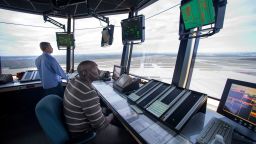URGENT UPDATE: Air traffic controller staffing shortages have dramatically escalated over the weekend, exacerbated by the ongoing government shutdown, now in its fourth week. With more than 50 staffing shortages reported since Friday morning, delays are affecting flights from Los Angeles to Washington, DC, raising alarm among travelers and officials alike.
The situation has become critical, as air traffic controllers are designated as essential workers but are not receiving pay during this shutdown. This lack of compensation is leading to increased absenteeism, with Transportation Secretary Sean Duffy stating that controllers are “wearing thin” and calling in sick due to the stressful conditions. Just yesterday, 22 staffing triggers were reported, marking one of the highest levels since the shutdown began on October 1Los Angeles International Airport (LAX), flights were temporarily halted on Sunday due to staffing issues at the Southern California TRACON, which manages air traffic in the region. Similarly, Reagan National Airport in Arlington, Virginia, faced ground delays expected to last until midnight. Since the shutdown commenced, 264 instances of staffing problems have surfaced at FAA facilities, significantly higher than the 60 reported during the same period last year.
The impact is staggering: over 6,000 flight delays were recorded on Sunday alone, with 27% of American Airlines flights experiencing delays attributed to these staffing challenges. Experts warn that these issues could persist and worsen as the shutdown continues, with Chad Mourning, an aviation safety specialist, predicting burnout among controllers is imminent.
The current crisis echoes the government shutdown from December 2018 to January 2019, when air traffic controller sickouts contributed to significant flight disruptions. Delays can cascade quickly, especially given the tightly coordinated schedules of airports like Hartsfield-Jackson Atlanta International Airport, which sees nearly 800,000 movements annually.
Travelers are feeling the stress, with anecdotal reports highlighting anxiety and frustration. One passenger, Connie, expressed her concerns, stating, “If I weren’t getting paid, I would be very angry; that would make it difficult to do my job.” Another traveler, Dylan Cousins, called for an immediate resolution to the shutdown, emphasizing the urgent need for lawmakers to come to an agreement.
As air traffic controllers continue to go unpaid, experts predict that the staffing shortages will not improve. Jake Rosenfeld, a sociology professor, noted that the current workforce is already overworked, and with no end in sight for the shutdown, workers are considering secondary employment to make ends meet.
The National Air Traffic Controllers Association has emphasized that they do not support any coordinated actions that disrupt air traffic. However, the growing frustration among controllers could lead to more sickouts in the coming days.
With the air traffic control system under significant strain, travelers are advised to prepare for ongoing delays. “Expect delays, right? If you need to be somewhere on a deadline, maybe tell the people expecting you to wait,” Mourning cautioned.
As the situation develops, it is crucial for travelers to stay informed. Follow updates on the ongoing crisis and its impacts on air travel.
